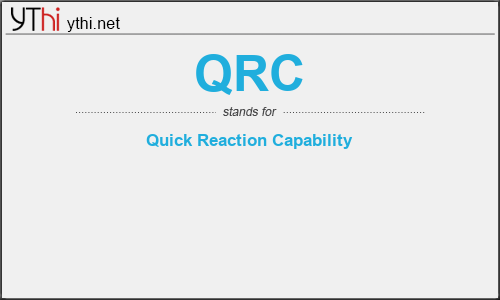What does QRC mean? What is the full form of QRC?
The Full Form of QRC is Quick Reaction Capability.
Military Quick Reaction Capability (QRC) programs are becoming more typical; with miracles expected. Higher performance and quality are demanded in less time with reduced cost. Aircraft platforms are continually modified for the latest mission system technology, which often requires a unique balance of secondary aircraft systems (structure, environmental control, and electrical). This paper investigates an agile integration architecture that is capable of reducing time and cost to the customer, while increasing mission performance and quality. A successful implementation would include increased risk mitigation for the program, as well as flexibility for future system evolution or even mission repurposing. With commercial aircraft as the platform for QRC mission systems integration, this paper shows how to create mission system modifications on a much shorter time scale then currently possible, by identifying and exploiting standard unifying aircraft features that exist across multiple platforms, or exist in reoccurring patterns on the same platform. Introduction A technology evolution and a shifting political landscape are consistently changing the type of threats we face and the type of war we fight. The military is diversifying, and the old programs and platforms of the Cold War Era are being combined and used in conjunction with platforms geared towards a new type of war. Even the acquisition process itself is changing. Quick Reaction Capability (QRC) programs are progressively more common, as faster acquisition and system integration times are essential to keep pace with technology and to stay ahead of dynamic threats. To the point, mission systems are often obsolete by the time they are delivered. Consequently, aircraft mission systems remain in a state of continuous modification. Mission systems can no longer stay static for any period of time and expect to address changing technology and global threats. With faster acquisition and mission system integration come risks, such as undefined future growth, underdeveloped mission requirements, schedule pressure, poor OEM/vendor support, and cost. To incorporate a mission system onto a platform while addressing the aforementioned risks, it is necessary to combine subsystems effectively using an architecture that can accommodate present and unforeseen future needs. The focus of the paper is on using an agile architecture to address the transient aspects of mission systems on aircraft secondary systems, such as structure (racks/consoles), environmental cooling systems (ECS), and electrical
QRC
means
Quick Reaction Capability![]()
Translate Quick Reaction Capability to other language.


Leave a Reply
You must be logged in to post a comment.